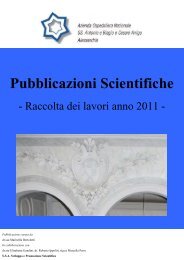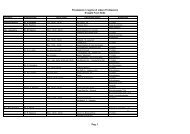Working Paper of Public Health Volume 2012 - Azienda Ospedaliera ...
Working Paper of Public Health Volume 2012 - Azienda Ospedaliera ...
Working Paper of Public Health Volume 2012 - Azienda Ospedaliera ...
You also want an ePaper? Increase the reach of your titles
YUMPU automatically turns print PDFs into web optimized ePapers that Google loves.
<strong>Azienda</strong> <strong>Ospedaliera</strong> Nazionale“SS. Antonio e Biagio e Cesare Arrigo”<strong>Working</strong> <strong>Paper</strong> <strong>of</strong> <strong>Public</strong> <strong>Health</strong>nr. 14/<strong>2012</strong>2. DiscussionThis paper has described the decisional process <strong>of</strong> a patient. According to their personalexperience and/or the experience <strong>of</strong> somebody close to them, there could be anoverestimation (or underestimation) <strong>of</strong> the expected output <strong>of</strong> the medical treatment, whichmakes it possible to estimate that there is a net benefit from going to the hospital located inthe other region (i.e. gravitational behavior model). On the one hand, there is a perception <strong>of</strong>what your home medical system could be whereas, on the other hand, there is the perception<strong>of</strong> what another system could be. Even if there is an information gap, the physician’sapproach might trigger this perception, pushing sick people to move towards a better place,i.e. towards a place where the reputation <strong>of</strong> the medical care system is better. This is exactlythe key hypothesis <strong>of</strong> the patients’ decisional process: the physician’s approach is themotivating factor <strong>of</strong> the patient’s perception, that is to say an approach that might validate (ornot) the reputation <strong>of</strong> a medical care facility and start (or not) a mobility process. Accordingto the gravitational behavior model, the physicians’ approach can induce an overestimation <strong>of</strong>the net benefit from going to the hospital located in the other region, higher than the net loss<strong>of</strong> consuming a quality level different from the desired one in the residential one.Starting from that decisional process, there could be a potential development in an empiricalanalysis aimed at supporting the main result <strong>of</strong> this work: the (positive) role <strong>of</strong>pharmaceutical clinical research in the patients’ mobility process, i.e. the choice <strong>of</strong> a medicalfacility to receive hospitalization. Obviously, considering the specific national background,also the (negative) role <strong>of</strong> political influence could be analyzed to better support the proposeddecision making process based on people’s perception.BibliographyAppelbaum P.S. (2002) Clarifying the Ethics <strong>of</strong> Clinical Research: A path toward Avoidingthe Therapeutic Misconception. American Journal <strong>of</strong> Bioethics, 2(2):22-23Appelbaum P.S., Roth L.H., Lidz C., Benson P., Winslade W. (1987) False Hope and BestData: Consent to Research and the Therapeutic Misconception. Hasting Center Report, April:20-24instead <strong>of</strong> saying “that hospital is fantastic, they make laparoscopic cholecystectomy in a beautiful way…”.Obviously, this approach is coherent with the idea <strong>of</strong> people affected by bounded rationality (i.e. technicallanguage).7



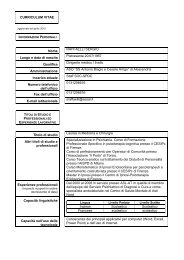
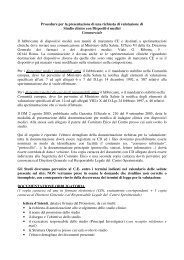

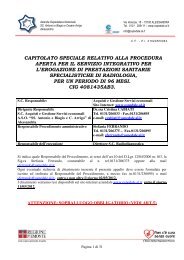
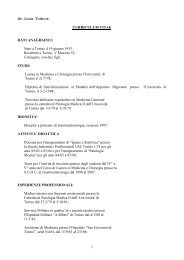
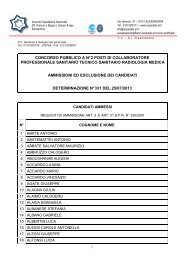

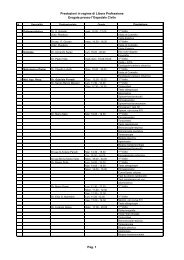


![[torino - 1] lastampa/urc/01 ... 26/10/09 - Azienda ...](https://img.yumpu.com/44058002/1/190x32/torino-1-lastampa-urc-01-26-10-09-azienda-.jpg?quality=85)

